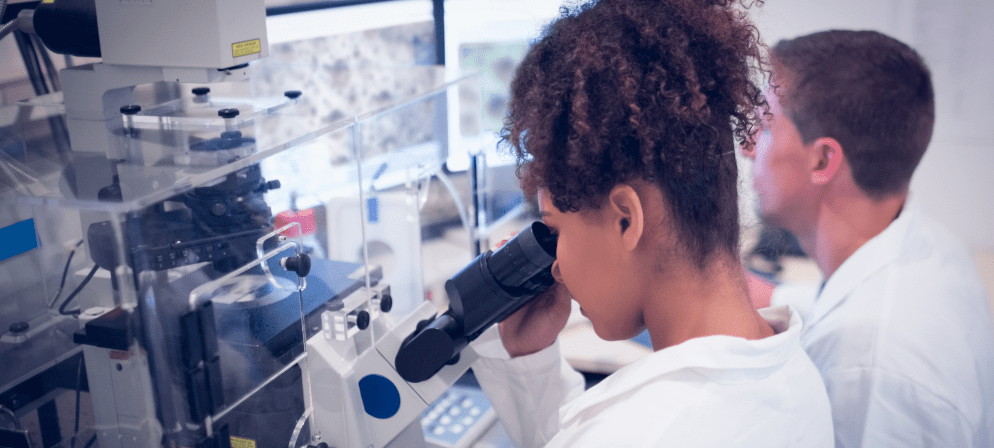To help explain what is pathology and what does a pathologist do, read on to learn more about this career path and what you can expect if you decide to become a pathologist after medical school.
What is Pathology?
Pathology is the study of disease. This field of medicine is the backbone of caring for patients and keeping them healthy. The sooner a doctor can find and diagnose a disease, the sooner they can work on getting the patient on the road to recovery. Pathology involves not only the diagnoses but also a deep understanding of the causes and effects of different types of diseases.
What does a pathologist do?
Doctors who study diseases are known as pathologists, and they can work in a variety of different capacities to further the understanding of different types of disease. While pathologists rarely work directly with patients in the way that a general practitioner would, pathologists often perform laboratory tests to help diagnose patients they never meet. This collaborative effort with general medical doctors is vital to getting patients diagnosed quickly, which can minimize the negative effects a disease can have on the patient’s body.
In addition to collaborative diagnosis, pathologists often conduct extensive research – from improving our understanding about certain diseases to finding new ways to locate a disease more quickly. Pathologists can research specific types of disease or specific diagnostic tools for finding disease. Some researchers specialize in studying the human genome to look for diseases that are genetically-linked as well.
In addition to testing and research, some pathologists work in a more analytical and consultative role. Pathologists can work as medical examiners, forensic consultants, or other service-based positions helping police and other investigators determine the ultimate cause of death. Since patients can often have multiple diseases or underlying complications, the job of these investigative pathologists is to drill down and determine the ultimate root cause of death.
What is it like to become a pathologist?
Before physicians can call themselves pathologists, they must undergo rigorous training and make some important decisions about which areas of pathology interest them most. Pathology is a broad, yet flexible medical field, so pathologists can carefully craft a career path that is both rewarding and fulfilling.
Education and Training
To become a pathologist, a student must complete 4 years of undergraduate work followed by 4 years of medical school. After graduating medical school, the student must complete a residency program lasting 3-7 years, depending on chosen subspecialty. While some pathologists complete fellowships or other continuing education, this additional training is less common in pathology than in other medical specializations and is primarily recommended for pathologists in specific subspecialty areas, such as dermatopathology or pediatric pathology.
Specializations
While all pathologists focus on diagnosing disease, there are many types of diseases and many ways to diagnose them. There are also many ways to aid in this diagnosis – pathologists can choose to be more hands on by evaluating test results and looking for pathogens, or they can be more research focused and test different ways to identify diseases. After completing a basic pathology residency, many aspiring pathologists will choose to niche down and complete a longer residency or fellowship for more experience in one of several officially recognized sub-specialties.
• Blood Banking/Transfusion Medicine: Doctors choosing this specialty are responsible for preparing and utilizing blood donations safely and keeping both donors and recipients safe during the transfusion process.
• Clinical Informatics: This specialization combines the skills of medicine and information technology to continually improve and refine the healthcare delivery process. These doctors focus on the clinician-patient relationship and how technology can be used to improve accuracy, speed, and comfort levels in the patient care process.
• Cytopathology: These pathologists specialize in diagnosing disease from blood or other bodily fluids. One of the most common procedures in this specialty is a “Pap” smear, which assesses female reproductive cells using a special stain.
• Dermatopathology: These specialists become experts in diagnosing and monitoring a variety of skin diseases using tissue samples, cellular scrapings and smears.
• Hematopathology: This pathway trains pathologists to become experts in diseases that affect bone marrow, blood cells, and lymph nodes. These diseases can include blood clotting disorders, anemias, leukemias, and other bleeding disorders.
• Neuropathology: Pathologists in this specialty train to diagnose diseases of the nervous system and skeletal muscles. These doctors are not neurologists or neurosurgeons, but they frequently consult with neurologists and neurosurgeons to provide comprehensive care to patients with these diseases.
• Pathology – Chemical: This aspect of pathology focuses on the biochemistry of the human body, especially as it relates to disease diagnosis and progression. By learning which bodily chemicals indicate certain diseases, these pathologists can conduct targeted tests to diagnose disease more quickly.
• Pathology – Forensic: These doctors investigate causes of sudden, unexplainable, or violent death. These specialists often work in tandem with members of a police force to evaluate homicides and other violent deaths.
• Pathology – Medical Microbiology: Specializing in this field involves working with many microscopic agents that cause disease, such as viruses or bacteria.
• Pathology – Molecular Genetic: Pathologists who are interested in genetic disorders and diseases may choose this specialty. They use genetic testing and analysis to confirm disease diagnoses and map out the genetic links between diseases and specific chromosomes.
• Pathology – Pediatric: These specialists work with diseases that develop in the womb or during infancy and child development.
Pathology Salary Expectations
According to the 2020 Medscape Pathologists Compensation Report, pathologists make about average across all licensed physician specialties. The average pathologist can expect to earn $318,000 per year, which is more than 13 other specialties, including neurology and internal medicine, but less than 15 other specialties, including cardiology, dermatology, and critical care.
Salary for pathologists can also vary significantly based on chosen subspecialties and geographic location. For example, pathologists who work in research or education settings make less, on average, than those who work in private practices. Molecular genetic pathologists and clinical informatics pathologists get paid more, on average, than forensic pathologists, and doctors who work in major cities can generally command higher salaries than those who live and work in smaller towns.
Frequently Asked Questions
What is a forensic pathologist?
A forensic pathologist is a doctor who works to determine cause of death, especially when an individual dies from sudden, unknown, or violent causes. Forensic pathologists often work as medical examiners or consultants for the police department to help assess crime scenes where homicides or other violent deaths are present.
Is a pathologist a good paying career?
While pathology is not the highest paying medical specialty for a doctor, pathologists do get paid more than general medicine practitioners and other common specialists, such as pediatricians or dermatologists. Depending on geographic location, chosen subspecialty, and industry, pathologists can expect to make approximately $318,000 per year.
How has the COVID-19 pandemic affected pathologists?
According to Medscape, physicians across all disciplines report a 55% decrease in revenue and a 60% decrease in patient volume as a result of the COVID-19 pandemic. While pathologists working in some clinical settings may be negatively impacted, other pathologists are fighting the disease on the frontlines in researching best practices for diagnosis, treatment, and prevention. Pathologists who are interested in researching the novel Coronavirus will likely have job security for the foreseeable future, and those who help to quickly diagnose patients can ultimately help save thousands of lives.








